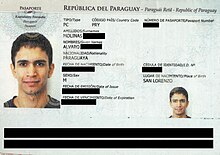Paraguayan nationality law


Paraguayan nationality law is based on the principle of Jus soli. The nationality law is based on the Chapter 3 of the Paraguayan Constitution of 1992.
Birth in Paraguay
Any person born in Paraguay acquires Paraguayan citizenship at birth. The only exception applies to children of persons in the service of a foreign government (like foreign diplomats).
Paraguayan citizenship by descent
Though based for the most part on the principle of Jus soli, Paraguayan law authorizes the acquisition of Paraguayan citizenship by descent (jus sanguinis) in two cases:
- a person born outside Paraguay of a Paraguayan parent who is in the service of the Paraguay government is considered Paraguayan ; and
- a person born outside Paraguay of a Paraguayan parent is considered Paraguayan, provided that that person either be registered with a Paraguayan .
Naturalisation as a Paraguayan citizen
Foreigners may apply for Paraguayan citizenship if they meet the following criteria:
- being older than 18 years old.
- permanent resident in Paraguay for more than 3 years.
- working in either a professional field, an office, in science, art, or industry.
- having a good behavior following the law.
Loss of citizenship
The two possible ways in which a Paraguayan may lose citizenship are by voluntarily obtaining a foreign citizenship and renouncing Paraguayan citizenship; or, in the case of naturalized Paraguayan citizens, living outside of Paraguay for more than three years.
